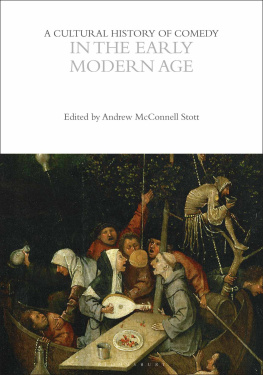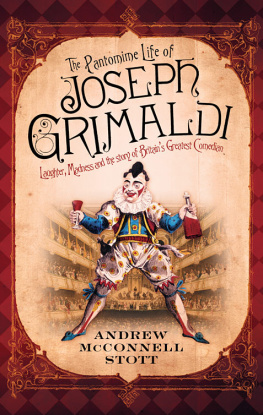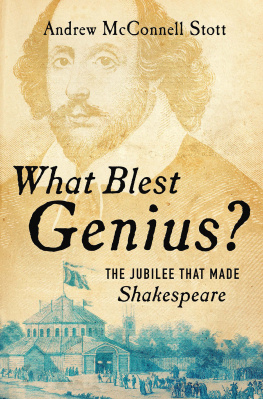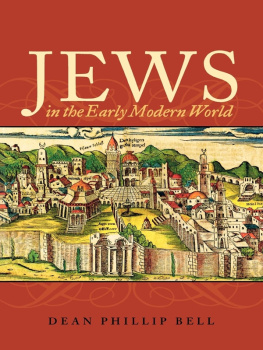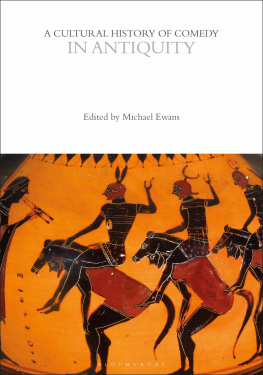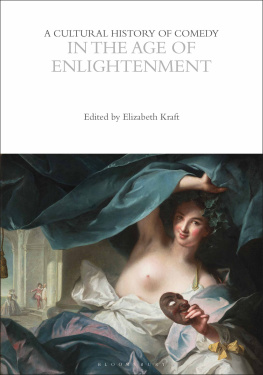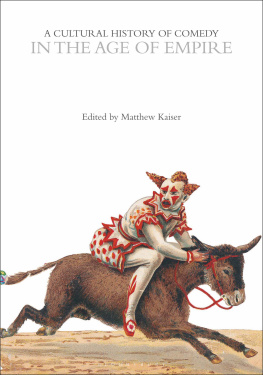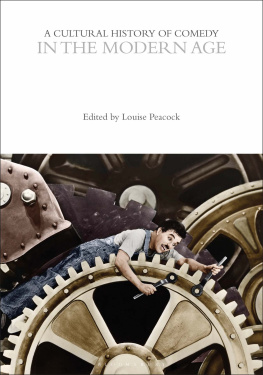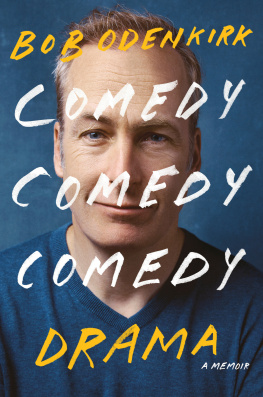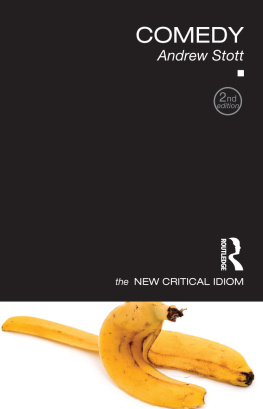
A CULTURAL HISTORY
OF COMEDY
VOLUME 3
A Cultural History of Comedy
General Editors: Andrew McConnell Stott and Eric Weitz
Volume 1
A Cultural History of Comedy in Antiquity
Edited by Michael Ewans
Volume 2
A Cultural History of Comedy in the Middle Ages
Edited by Martha Bayless
Volume 3
A Cultural History of Comedy in the Early Modern Age
Edited by Andrew McConnell Stott
Volume 4
A Cultural History of Comedy in the Age of Enlightenment
Edited by Elizabeth Kraft
Volume 5
A Cultural History of Comedy in the Age of Empire
Edited by Matthew Kaiser
Volume 6
A Cultural History of Comedy in the Modern Age
Edited by Louise Peacock

CONTENTS
INTRODUCTION
Fools Cap Map of the World.
The scholar-fool at his desk.
CHAPTER ONE
A comic actor addresses his audience.
Title page, Robin Good-Fellow, his Mad Prankes and Merry Iests.
Shakespeares First Folio.
CHAPTER TWO
The Bishops Ban, 1599.
Title page, Every Man Out of His Humor.
CHAPTER THREE
The Theatre, Shoreditch.
Interior of the Red Bull Playhouse, Clerkenwell.
Swan Theatre, Bankside, c. 1595.
CHAPTER FOUR
Miles Gloriosus, the braggart soldier.
Rosalind, disguised as Ganymede.
Shylock.
CHAPTER FIVE
The Battle Between Carnival and Lent.
Pantagruel by Rabelais.
Malvolio in Twelfth Night.
Water-closet from Sir John Harington, The Metamorphosis of Ajax, 1596.
CHAPTER SIX
Richard III as stage Vice.
Staging diagram from The Castle of Perseverance.
Falstaff punished in The Merry Wives of Windsor.
CHAPTER SEVEN
The Four HumorsPhlegm, Blood, Choler, and Black Bile.
Erasmus of Rotterdam by Quentin Metsys.
Portrait of Baldassare Castiglione.
CHAPTER EIGHT
Frontispiece to Tarltons Jests.
Frontispiece to Kemps Nine daies wonder.
Frontispiece to The History of the Two Maids of More-Clacke.
Douglas Bruster is Mody C. Boatright Regents Professor of American and English Literature, and Distinguished Teaching Professor at the University of Texas at Austin. His books on Shakespeare and early modern drama include Drama and the Market in the Age of Shakespeare (1992/2005), Quoting Shakespeare (2000), Shakespeare and the Question of Culture (2003), Prologues to Shakespeares Theatre (2004), To Be or Not To Be (2007), and Shakespeare and the Power of Performance (2008). He is editor of several early modern play texts, including Thomas Middletons The Changeling, the morality plays Everyman and Mankind, and A Midsummer Nights Dream.
Megan Herrold is a lecturer at the University of Southern California specializing in medieval and early modern literature and culture, allegory, and political, feminist, and queer theory. Her work has appeared or is forthcoming in Studies in Philology, a collection from Amsterdam University Press on games and game playing, and the Women Writers Projects online collaborative research initiative on Intertextual Networks. Having received her PhD from USC and her MA from the University of Virginia, her book project is called Productive Misogyny in Early English Literature: Allegories of Gendered Personhood and Queer Social Order.
Indira Ghose is Professor of English at the University of Fribourg in Switzerland. She is currently working on a monograph on how the Renaissance culture of civility has shaped the early modern theater. Her books include Women Travellers in Colonial India (1998), Shakespeare and Laughter: A Cultural History (2008) and Much Ado About Nothing: Language and Writing (2018). A book on jokes in Shakespeare, Shakespeare in Jest, is due to appear in 2021.
James Loxley is Professor of Early Modern Literature at the University of Edinburgh. He has published widely on early modern literature and culture, beginning with his monograph Royalism and Poetry in the English Civil Wars (1997). Subsequent books include Ben Jonson (2001), Shakespeare, Jonson and the Claims of the Performative (2013; co-written with Mark Robson), and an edition of a previously unknown eyewitness account of the celebrated walk from London to Edinburgh undertaken by Jonson in the summer of 1618, Ben Jonsons Walk to Scotland (2015; co-edited with Anna Groundwater and Julie Sanders). His interests also encompass critical theory, with a particular focus on the work of J. L. Austin, Stanley Cavell, and the concept of performativityhis synoptic New Critical Idiom account of the latter, Performativity, was published in 2007, and he co-edited a collection of essays, Stanley Cavell: Philosophy, Literature, Criticism (2011) with Andrew Taylor. In recent years he has led collaborative projects with specialists in textmining and computer-human interaction to create a digital literary map of Edinburgh, LitLong.org. His current projects include further work in cultural mapping and digital literary interaction in collaboration with the Edinburgh International Book Festival and the Edinburgh City of Literature Trust, an edition of Thomas Dekkers city comedy The Shoemakers Holiday for Arden Early Modern Drama, and a monograph on Anglo-Scottish cultural relations during the reigns of James VI and I.
Maya Mathur is Professor of English at the University of Mary Washington. Her research focuses on the intersections of comedy, vagrancy, gender, and popular protest in early modern drama. Her work has appeared in Journal for Early Modern Cultural Studies, Early Modern Literary Studies, Early Theater, the Journal for Medieval and Early Modern Studies, and the MLA Approaches to Teaching series. Her recent scholarship examines adaptations of Shakespeare in the global south, especially Shakespeare and India.
Lucy Munro is a professor in Shakespeare and Early Modern Literature at Kings College London. Her publications include two monographs, Children of the Queens Revels: A Jacobean Theatre Repertory (2005) and Archaic Style in English Literature, 15901674 (2013), and editions of plays by Shakespeare and Wilkins, Sharpham, Brome and Fletcher, and Dekker, Ford, and Rowley. In addition to writing and research, she is also Vice President of the Marlowe Society of America, Publicity Officer for the Malone Society, and a member of the Architecture Research Group at Shakespeares Globe.
Will Stockton is Professor of Renaissance Literature at Clemson University, and author of several books including Members of His Body: Shakespeare, Paul, and a Theology of Nonmonogamy (2017), and Playing Dirty: Sexuality and Waste in Early Modern Comedy (2011).
Andrew McConnell Stott is Professor of English at the University of Southern California, working on British popular culture from the sixteenth to nineteenth centuries, with a focus in comedy, biography, and theater history. His books include
Next page
